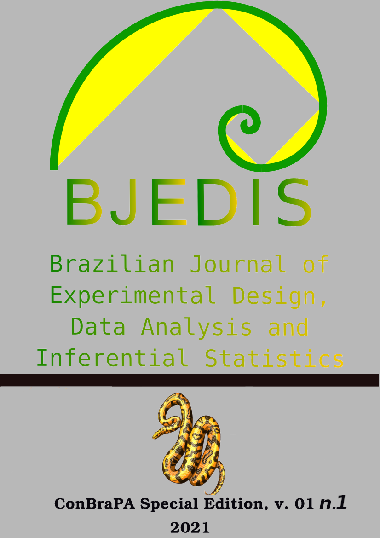Preliminary Study on the Application of the Python Language as a Tool for the Randomization of Laboratory Experiments: a Short Course at ConBraPA 2020
DOI:
https://doi.org/10.55747/bjedis.v1i1.48409Keywords:
Python, Programming, Completely Randomized Design, Application, Education, Short CourseAbstract
Digitization, network operation and an emphasis on data become the main attributes of smarter production, the core of a phenomenon declared as Industry 4.0, or the fourth industrial revolution, or even the fourth technological era. Amid the revolution of the fourth technological age that occurs in our society, the demand for professionals with programming skills stands out. A first challenge in this context concerns how to train professional programmers, in a current, effective, and versatile programming language. A second challenge concerns how to provide this professional with a useful programming base for experimental planning and data analysis, already integrating his programming learning with experimental planning theory. In line with these challenges, a Python language computer programming course was developed with application in the context of the Completely Randomized Design (CRD). The objective of this work is to present and discuss the short course, its construction methodology, and the results of this short course, which took place at the 1st Brazilian Conference on Experimental Planning and Data Analysis (ConBraPa 2020). The main results were: (i) participants learnt about basic programming logic, (ii) participants learnt about using basic instructions in the Python programming language, (iii) participants learnt how to create a randomized experimental sketch in the context of CRD using Python, (iv) elaboration of a specific short course construction methodology. It is noteworthy that, through evaluation with a questionnaire, it was possible to conclude that 100% of the participants in the short course who answered the questionnaire evaluated the short course as beneficial.
Downloads
Downloads
Published
Issue
Section
License
AUTHORS’ DECLARATION AND COPYRIGHT TRANSFER AGREEMENT
The undersigned authors hereby declare that the submitted manuscript is an original work and has not been previously published or submitted, in whole or in part, to any other journal. The authors further commit not to submit this work to any other journal while it is under consideration by BJEDIS.
We affirm that the manuscript is free from plagiarism, and we accept full responsibility for any allegations of academic misconduct that may arise.
By submitting this manuscript, the authors irrevocably transfer all copyrights of the work—including, without limitation, the rights of reproduction, distribution, translation, and public communication in any form or medium—to BJEDIS. Any breach of this agreement may result in legal action in accordance with the Brazilian Copyright Law (Law No. 9.610 of February 19, 1998).
The authors also declare that there are no conflicts of interest related to this work. All sources of financial support have been properly acknowledged in the funding section of the manuscript.



